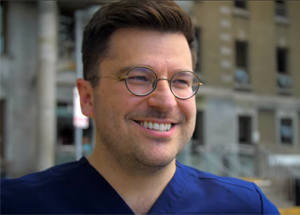 Dr. My Lan Graziani is a young family physician who works at St-Mary’s hospital and at the Department of Family Medicine at St Mary’s. Her practice consists of regular family clinics, supervision at the St-Mary’s residency teaching site, 24-hour calls in obstetrics, and providing healthcare for refugees without RAMQ at Médecins du Monde.
Dr. My Lan Graziani is a young family physician who works at St-Mary’s hospital and at the Department of Family Medicine at St Mary’s. Her practice consists of regular family clinics, supervision at the St-Mary’s residency teaching site, 24-hour calls in obstetrics, and providing healthcare for refugees without RAMQ at Médecins du Monde.
In order to better understand obstetrical care in family medicine, I had the recent pleasure of interviewing Dr. Graziani about her work.
Why family medicine?
According to Dr. Graziani, family medicine is a diverse field that can not only allow us to dabble in a bit of everything, but also let us get to know our patients and see them grow through a lifetime. She was extremely interested in Women’s Health, including sexual health, family planning and obstetrics, all of which occupy a big part of her current practice.
She was further inspired by her own family doctor, Dr. Roland Grad, who is an excellent, empathetic and evidence-based clinician-researcher based out of the Herzl at the Jewish General Hospital.
What did you do before medical school? Where did you do medical school and residency?
After CEGEP, Dr. Graziani pursued some studies in Social Sciences and Journalism at UQAM before cancelling her session and taking the missing science classes she needed to be admitted into pre-med. She then did her medical school at University of Montreal, her family medicine residency at St. Mary’s Hospital (McGill University) and her fellowship at Queen’s University. During her fellowship, she had the wonderful opportunity of training in various cities, including Toronto, Ottawa, Kingston and even Sri Lanka!
Why did you choose to do extra training in obstetrics? What did the extra training consist of?
Dr. Graziani completed extra training in Women’s Health, which included obstetrics, family planning, midwifery and global health. She felt she had a pretty good exposure to low-risk obstetrics during her residency, having done a few electives in that field. She wanted to hone her skills in family planning (complex contraception cases, abortion care) and high-risk obstetrics. Therefore, she completed a total of 6 months of fellowship: 2 months of obstetrics in Toronto, 2 months of family planning in Ottawa and Kingston, 1 month of midwifery care in Kingston and 1 month of Global Health research on postpartum depression in Sri Lanka with the University of Copenhagen.
What is the scope of your practice? What does a typical day look like in obstetrics?
Dr. Graziani does regular family practice (all ages, all genders, all pathologies), supervision at the residency teaching site at the Department of Family Medicine at St Mary’s, and Family Medicine Obstetrics at St. Mary’s Hospital. Once a month, she also provides clinical care for patients without RAMQ at Médecins du Monde. In obstetrics, here are 24-hour calls. Dr. Graziani usually cancels any other activities for the day that she is on call. In Family Medicine Obstetrics, she usually sees all the patients passing through triage, admits the relevant cases to the caseroom for induction or labour, does the deliveries, and sees the postpartum patients and their babies on the postpartum ward.
“I think being a family physician has let me recognize
my qualities as well as my flaws as a person.”
What is the typical patient population that you work with? Even during my 4 weeks of clerkship in urban family medicine, I noticed that there were many immigrant patients at St-Mary’s who do not always speak the same language or have the same culture. What are the challenges of working with a more homogenous or heterogenous patient population, especially during deliveries?
Dr. Graziani has an extremely diverse family medicine practice. In fact, she inherited the patients of a wonderful physician who retired 2 years ago and had accumulated a very varied caseload during her 20 years of practicing in Montreal. Being in the Cote-des-Neiges area, one of the most multicultural areas, she sees patients from diverse backgrounds.
Obstetrical care is quite varied as well; a big part of her patient population is refugee claimants, mostly from the Parc-Extension area. This is because, while there are a few clinics in the area who do prenatal care, there are no hospital-based obstetrics team there, so a lot of the patients end up going to St-Mary’s hospital. It’s an extremely fulfilling but challenging practice; some patients do not speak English at all, and they do not always have an interpreter at hand. It is especially difficult to assess the social issues which are particularly important in prenatal care (conjugal violence, resources at home, safe pediatric care) – they usually have to make do with a friend over the phone acting as an interpreter. The CLSC nurses are also a big help: they can provide follow-up for these patients and help them access specific programs like Fondation OLO, social workers, programme SIPPE, Maison-Bleue, etc.
How did your career impact you as a person? Were there any impacts on your family life?
To quote Dr. Graziani directly, “I think being a family physician has let me recognize my qualities as well as my flaws as a person; I am empathetic, dedicated but at times impatient, easily overwhelmed. I was definitely extremely motivated and energetic during the first 3 months of my practice! I still find a lot of joy in my practice but I’ve recently decided that it is OK to set some boundaries between your professional and personal life, to try and disconnect from work when at home, to accept that you can make some mistakes and not be loved by every single patient you will cross during your career. You can’t serve anyone well if you are burnt out or unhappy.”
Parting advice for medical students
To conclude, I asked if she had any advice for medical students who are unsure about choosing Family Medicine, or for those who are debating between family medicine and OB/GYN. Dr Graziani replied that Family Medicine is a constantly evolving specialty and that there is a lot of space in Family Medicine to subspecialize in a domain that is intellectually stimulating (women’s health, pediatrics, mental health, hospitalist, acute care, sports medicine). If you are really in love with Obstetrics and/or Gynecology and cannot imagine yourself practicing any other kind of medicine and want to be a surgeon, then OBGYN is probably more for you. But there is definitely a way to take the nuggets of that specialty and make your practice your own.
 Xiaoya Gao
Xiaoya Gao
McGill University, Class of 2021
Co-president of the McGill University FMIG










